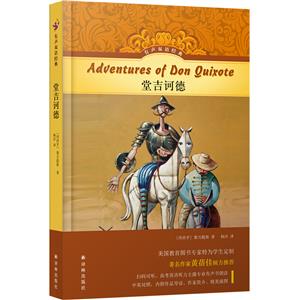-
>
考研英語背單詞20個詞根詞綴
-
>
西班牙語詞根寶典
-
>
美國K-12原版語文課本--初中·下(全12冊)
-
>
流浪地球劉慈欣
-
>
西南聯大英文課 輕讀禮盒版
-
>
英語大書蟲世界經典名譯典藏書系:中國人的精神 (英漢對照)(精選權威版本)
-
>
許淵沖譯唐詩三百首:漢文·英語
有聲雙語經典:堂吉訶德 版權信息
- ISBN:9787544783712
- 條形碼:9787544783712 ; 978-7-5447-8371-2
- 裝幀:一般膠版紙
- 冊數:暫無
- 重量:暫無
- 所屬分類:>>
有聲雙語經典:堂吉訶德 本書特色
譯林“有聲雙語經典”原版引進美國教育專家特為學生編寫的英語名著,精選貼近中國學生英語習得水平的經典作品。叢書甄選優質中文譯本,配以導讀、作家作品簡介和插圖,并聘請資深高考聽力卷主播朗讀英語有聲書。有聲書播放平臺操作便捷,只需掃描書中二維碼,即可收聽、下載。叢書選目涵蓋各國經典文學作品,讓孩子在閱讀中提高文學鑒賞能力和英語聽讀能力。著名兒童文學作家黃蓓佳長文導讀推薦。 作為文藝復興時期的現實主義巨作,《堂吉訶德》在經過近四百年的流傳后,已成為世界文學寶庫的一顆明珠。游俠騎士堂吉訶德和他的仆從桑丘??潘沙一道在外行俠仗義,踐行著自己的理想主義,經歷了種種荒誕不經之事,在令人發笑的同時又非常引人深思。如今,堂吉訶德的理想主義光輝在種種改編后的音樂劇、影視劇中煥發出了新的活力,激勵著現代的人們繼續追尋并堅持內心的信仰與美好。
有聲雙語經典:堂吉訶德 內容簡介
在本書中,沒落鄉紳堂吉訶德因癡迷騎士小說,幻想以騎士之道行走世界,打抱不平。他與自己的仆從桑丘·潘沙一道先后幾次外出,行俠仗義。他們一起經歷了風車大戰、獅群冒險、木馬奇遇等種種奇特事件,☆終回到家鄉,幡然醒悟。作者塞萬提斯借種種荒誕不經之事,突顯了堂吉訶德的理想主義光輝,也哀嘆了信仰時代的終結。富于幻想的堂吉訶德和講究實際的桑丘如今已經成為世界文學中的經典形象。
有聲雙語經典:堂吉訶德 目錄
第1章 身披盔甲的騎士
第2章 堂吉訶德離家
第3章 多管閑事的代價
第4章 堂吉訶德和桑丘??潘沙的奇遇
第5章 更多奇遇
第6章 重回拉曼查
第7章 堂吉訶德得知他已出名
第8章 重新上路
第9章 林間騎士
第10章 獅群冒險
第11章 木偶戲
第12章 在公爵的宮殿里
第13章 木馬奇遇
第14章 堂吉訶德建議桑丘
第15章 終身總督桑丘
第16章 島上險象
第17章 桑丘的明智決定
第18章 騎士和侍從重聚
第19章 白月騎士
第20章 堂吉訶德病逝
Table of Contents
CHAPTER 1 A Knight in Armor
CHAPTER 2 Don Quixote Leaves Home
CHAPTER 3 The Price of Meddling
CHAPTER 4 Don Quixote and Sancho Panza
Have Some Strange Adventures
CHAPTER 5 More Strange Adventures
CHAPTER 6 Back to La Mancha
CHAPTER 7 Don Quixote Learns He Is
Already Famous
CHAPTER 8 On the Road Again
CHAPTER 9 The Knight of the Wood
CHAPTER 10 The Adventure of the Lions
CHAPTER 11 The Puppet Show
CHAPTER 12 At the Duke’s Palace
CHAPTER 13 The Adventure of the Wooden
Horse
CHAPTER 14 Don Quixote Advises Sancho
CHAPTER 15 Sancho, Governor for Life
CHAPTER 16 Danger at the Island
CHAPTER 17 Sancho’s Wisest Decision
CHAPTER 18 Knight and Squire Reunited
CHAPTER 19 The Knight of the White Moon
CHAPTER 20 Don Quixote’s Last Illness
有聲雙語經典:堂吉訶德 節選
第1章 身披盔甲的騎士 從前,有個人書讀得太多,結果發了瘋。他只讀有關騎士的書,這正是問題所在。這些書講述了身披盔甲的騎士的冒險之旅——他們與惡龍、怪獸、巨人、巫師,甚至其他騎士的奇遇。書里也談情說愛,因為每個騎士都有一位夢中情人。 這人很快就對那些離奇的故事信以為真。有一天,他決定要當一名騎士,因為他想懲惡揚善。他獨自在屋里頭練習騎馬比武。砰!砰!砰!就像書里的英雄似的,他總是贏。 這一切都發生在拉曼查省的一個小村莊里,該省位于西班牙中心。這個人同他的祖祖輩輩一樣,一輩子都生活在這個小地方。他五十來歲,又高又瘦,留著撮小胡子。從沒有人覺得他會做壞事,也沒人覺得他不好,因為他是個體面人,是位完美的紳士。他家里還住著兩個人,一個是他漂亮快活、天真無邪的侄女,約莫二十歲;另一個是胖乎乎的管家,大概四十歲,心地善良,對什么事情都很有主見。還有個男孩負責做家務。 這位紳士究竟姓甚名誰,尚不清楚。有人說他叫阿隆索?? 奎薩諾,但說不定姓奎薩達、克薩達或者克薩諾。他出身名門——這就是他被稱為堂?? 阿隆索的原因。他繼承了一小塊土地,但其他的寥寥無幾。當他病了,他賣掉好些良田,全部去買自己愛看的小說。 有一天,他展開做騎士的實際準備。家里頭翻出來一套盔甲,是他曾祖父的。他又是清洗,又是拋光,還盡可能地把它修整好。頭盔破爛不堪,得捆起來才行。他已經有了一匹馬——雖然垂垂老矣,瘦骨嶙峋,根本算不上是匹馬,但也算有個坐騎了。他花了整整四天工夫,尋思著給它取個好名字。就叫它羅西納特吧,這名字可真不錯!“羅西”是個西班牙詞,意思是“馬”或者“馱馬”,“納特”意思是“以前”。對大多數人來說,這個名字的意思是“這以前是一匹馬”,但是對堂?? 阿隆索而言,它意味著駿馬良駒,世間無有出其右者! 而他自己的名字,堂?? 阿隆索,對一位騎士來說還不夠好。他改名成堂吉訶德——又添上“拉曼查的”幾個字,這下大家伙兒都能知道他打哪兒來。拉曼查的堂吉訶德——不愧是位騎士的堂堂大名! 然而,他還是需要一位小姐,一位能讓他魂牽夢縈,接受潰敗敵人之效忠的小姐。沒人知道他已墜入愛河,可他的確如此……他藏著掖著,似乎連那位女士都不知道他喜歡她!她是附近埃爾托巴索的一個農家女,毫不起眼、舉止粗野、平淡無奇,名叫阿爾堂莎?? 洛倫索。他這輩子只見過她一次。在她一無所知的情況下,堂吉訶德宣稱她是自己的“小姐”,管她叫埃爾托巴索的杜爾西內婭。跟其他名頭一樣,她的名字也是經過精挑細選的:它出自西班牙詞語“杜爾塞”,意思是“甜美的”。 做好準備后,堂吉訶德滿意極了。 CHAPTER 1 A Knight in Armor Once, there was a man who went crazy from too much reading. He only read books about knighthood; that was the problem. Those books told about the adventures of knights in armor—their fantastic encounters with dragons, monsters, giants, wizards, and even other knights. There was also talk of love, because each knight had a lady of his dreams. Soon the man came to believe that all those fantastic tales were true. One day, he decided to become a knight, for he wanted to right all that was wrong in the world, and punish evil. Alone in his room, he practiced jousting. Wham wham wham! Like the heroes in his books, he always won. All this happened in a little village in a province called La Mancha, in the heart of Spain. The man had lived in the same place all his life, as his parents and grandparents had before him. He was about fifty, tall and thin, and he had a small beard. No one would ever expect anything bad from him or think anything wrong about him, for he was an honorable man, a perfect gentleman. Two other people lived in his home; they were his pretty, cheerful, innocent niece, about twenty, and his plump housekeeper, about forty, who was a good, friendly soul, with strong opinions about everything. A boy did chores around the house. It is not clear what the gentleman’s real name was. Some think it was Alonso Quixano, but the last name could have been Quixada, Quesada, or Quexana. He came from a respectable family—that’s why he was called Don Alonso. He had inherited a little land, but very little else. When he became ill, he sold many acres of good farmland to buy more of his favorite books. One day he began the actual preparations to become a knight. Somewhere in the house there was an old suit of armor that had belonged to his great-grandfather. He cleaned it, polished it, and fixed it up as best he could. The helmet was in such bad shape that it had to be tied together. A horse he already had—old and bony, not much of a horse, but a mount nonetheless. He spent four whole days thinking of a good name for his horse. It would be Rocinante. And what a good name it was! Rocín is a Spanish word that means “nag” or “workhorse”; and antes means “before.” To most people, the name means “This was once a horse,” but to Don Alonso, it meant a steed above and beyond all other horses in the world! His own name, Don Alonso, didn’t seem good enough for a knight. He changed it to Don Quixote, and added de la Mancha so everyone would know where he came from. Don Quixote de la Mancha. What a fine-sounding name for a knight! But he still needed a lady, a lady to dream about, a lady to receive homage from his defeated enemies. No one knew he was in love, but he was ... so secretly, it seems, that even the lady herself didn’t know he liked her! She was a farm girl from nearby El Toboso, and she was plain, rough, ordinary. Her name was Aldonza Lorenzo. He had seen her only once in his life. Without her knowledge, Don Quixote pronounced her his “lady” and called her Dulcinea del Toboso. Her name, like the others, was well chosen: it comes from the Spanish word dulce, which means “sweet”. Don Quixote was very pleased with his preparations.
有聲雙語經典:堂吉訶德 作者簡介
塞萬提斯(Miguel de Cervantes Saavedra,1547—1616)是西班牙文藝復興時期偉大的小說家、劇作家和詩人。他出身貧寒,自童年起便過著顛沛流離的生活,做過多種底層工作,生活的不幸加深了他對勞苦人民的認同,也成了他寫作的靈感來源。他分別于1605年和1615年創造出膾炙人口的傳世巨作《堂吉訶德》的上下卷,取得了巨大成功,但并未改善自己的貧困狀況,☆終于1616年在貧病交加中溘然長逝。
- >
推拿
- >
小考拉的故事-套裝共3冊
- >
中國人在烏蘇里邊疆區:歷史與人類學概述
- >
名家帶你讀魯迅:故事新編
- >
煙與鏡
- >
巴金-再思錄
- >
龍榆生:詞曲概論/大家小書
- >
山海經
















